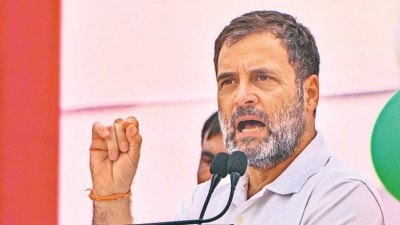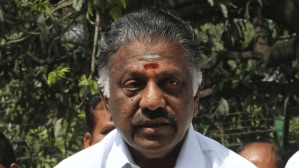At Jantar Mantar, thousands protest for Dalit rights; demand abolition of bonded labour, right to land
With posters, flags and signatures to support a Charter of Demands in hand, the participants had plans to march to Parliament Street but were stopped by authorities.
 People from the Dalit community stage a protest at Jantar Mantar, in New Delhi, Monday, Dec. 4, 2023. (PTI Photo)
People from the Dalit community stage a protest at Jantar Mantar, in New Delhi, Monday, Dec. 4, 2023. (PTI Photo)Having marched to the Capital from different states, thousands of people gathered at the Jantar Mantar on Monday to push for Dalit rights and social justice.
The protesters, who had joined hands under various banners, demanded abolition of bonded labour acts; distribution of land to the landless; ensuring Dalit access to pattas that were distributed earlier; stringent punishment for those guilty of assaulting Dalit women and girls; and alternate work for manual scavengers, among others.
With posters, flags and signatures to support a Charter of Demands in hand, the participants had plans to march to Parliament Street but were stopped by authorities.
Besides several leaders of organisations working for Dalit rights, the gathering was addressed by John Brittas and Sivadasan, Members of Parliament (MPs) from the Communist Party of India (Marxist); Binoy Viswam, Rajya Sabha MP from Kerala; and Manoj Jha, Rajya Sabha MP and national spokesperson of the Rashtriya Janata Dal (RJD), among others.
“The plight of Dalits along with Adivasis and others facing discrimination is contrary to what was expected after 76 years of the nation’s independence. Some progress has been made but landlessness and poverty persist along with prejudice and caste discrimination. In the last nine years, the situation has worsened,” according to a statement by the Coordination Committee for Dalit Rights.
Many attendees demanded an increased outlay for MGNREGA, and complained of laxity in the scheme’s implementation. “MGNREGA had acted like a lifeline for many landless farmers like me, but the cut in its budget has seriously affected us… currently, I am being paid Rs 200 as daily wage which is often not paid on time… this affects the livelihood of many landless farmers,” said Jigdas Singh, a landless farmer from Punjab, at the National Dalit Summit.
“MGNREGA is under constant attack from the government… not only has the number of work days decreased but large numbers of those who have worked have not been paid their dues for months. Who is stopping the government from giving work to landless Dalits?” Gulzar Singh Guria, who works for Dalit rights, asked while addressing the crowd.
Baran Kumar, a civil service aspirant from Jharkhand, carried a poster demanding the withdrawal of the New Education Policy (NEP): “It will destroy educational opportunities for Dalits and the poor. It must be scrapped or the marginalised will never be able to receive quality education…the rural-urban divide being created by the policy will impact the Bahujan Samaj deeply.”
Talking about Dalit atrocities, Banwari Lal, a paddy farmer from Rajasthan, said inequalities in the form of untouchability are still deeply prevalent in his village: “There is no water available, no profit in farming, most Dalits still work as bonded labourers, people still refuse to talk and sit with us… we approached the village pradhans to help resolve issues but they always protect the rich and the privileged,” Lal said.
The attendees also made suggestions on ways to improve the condition of Dalits in the country. They demanded free and high-quality education for all Dalits, identification of areas prone to atrocities on Dalits and deployment of forces there, and establishment of special fast-track courts to address cases of atrocities against the community.












